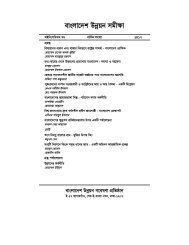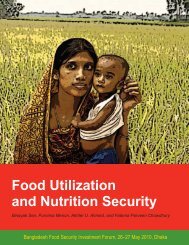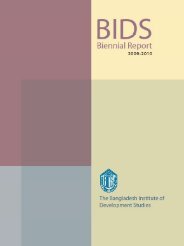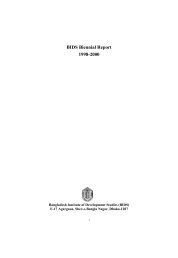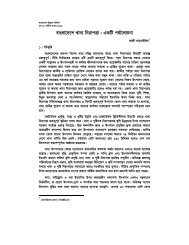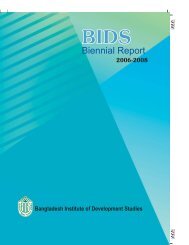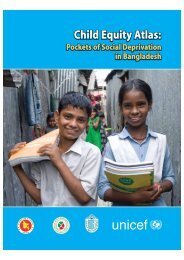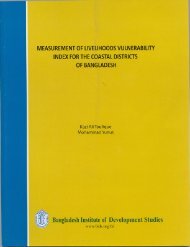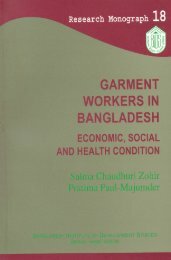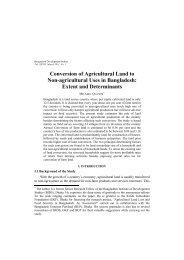INTEGRATED PROTECTED AREA CO-MANAGEMENT (IPAC) - BIDS
INTEGRATED PROTECTED AREA CO-MANAGEMENT (IPAC) - BIDS
INTEGRATED PROTECTED AREA CO-MANAGEMENT (IPAC) - BIDS
Create successful ePaper yourself
Turn your PDF publications into a flip-book with our unique Google optimized e-Paper software.
nets” to the collectors, along with adequate amount of credits for the collectors on favorable<br />
terms 96 . At the same time, the banks can also help promote the effort of conservation while<br />
sanctioning loans. Repayment schedules and horizons should be flexible and reflect the likely<br />
cash flow of the activities in question. Proper monitoring mechanism should be in place that<br />
would assess that their incomes have been raised and debt burdens have been reduced.<br />
At the first stage, some priority sectors can be taken up for the purpose on a pilot basis. At the<br />
same time, appropriate authority should take safety net programs for the SRF actors,<br />
particularly the collectors, and extend support during lean periods or at the time of crisis such as<br />
natural hazards. Like what was taken up with SMEs, the Bangladesh Bank can take the<br />
initiatives in this respect through, for example, launching refinancing schemes.<br />
Improving Terms of Trade and Marketing System<br />
Our field survey shows there are many ways of debt repayment in practice - repayment in cash<br />
with interest (47.6%) or without interest (4.0%), repayment in goods at market price (16.7%)<br />
and repayment at reduced market price (33.3%) (See Chapter 3). Our investigation reveals that<br />
the collectors have to sell their collected products at a price reduced by approximately 22.5<br />
percent compared to prevailing market price.<br />
In order to pull the SRF harvesters out of poverty better contracting arrangements would be<br />
helpful. There can be several ways of improving terms of trade and marketing systems for the<br />
SRF products.<br />
Transportation and Storage/Depot Facilities<br />
The cost of transportation and the time needed in transportation are very crucial for the<br />
collectors, especially the fishers, golpata or honey collectors. The study reveals that economics<br />
of SRF extraction is directly related to distance of primary landing place from harvest place<br />
(which is 41 Km), which enhances transportation costs (See Chapter 3). One important way in<br />
this regard is to foster and expand spot markets and auctions, which will reduce transportation<br />
costs and at the same time ensure offering lower level actors higher prices 97 . Increasing the<br />
number of depots and landing places could also minimize the transaction costs in the value<br />
chains and the time for transportation to ensure that the returns are evenly distributed. This<br />
would help particularly fishery sector. The Department of Fisheries needs to identify regions<br />
lacking depots and arrange accordingly. Increasing the number of depots and landing places was<br />
suggested by a large number of poor harvesters (See Chapter 3). It is also important to develop<br />
linkages between collectors and relevant processing plants, which is expected to reduce the<br />
number of intermediaries.<br />
Enhancing Bargaining Power of the Collectors<br />
During our survey, a large number of collectors (66%) complained that they were not getting fair<br />
prices for the harvested products (See Chapter 3) while 47 percent reported that there were<br />
limited number of buyers (e.g., Aratdars) so that the buyers could easily monopolize. In<br />
96 Currently, the government has a number of safety-net programs implemented in coastal areas but hardly any of<br />
these are specifically targeted to SRF stakeholders, except only a few targeted to fishermen in lean seasons.<br />
97 This was also suggested by a study by USAID (2006)<br />
162



